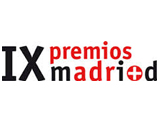This category honours the research projects approved by the European Commission corresponding to the calls for projects falling within the Cooperation Programme of the 7th Framework Programme, coordinated by research groups from Public Research Centers forming part of the madri+d research and development system.
 With this Prize, the Directorate General of Universities and Research of the Department of Education, Youth and Sports of the Regional Government of Madrid recognizes excellence in the arrangement of international collaborative activities in the R&D area.
With this Prize, the Directorate General of Universities and Research of the Department of Education, Youth and Sports of the Regional Government of Madrid recognizes excellence in the arrangement of international collaborative activities in the R&D area.
madri+d award to the Best European R&D Cooperative Project
The Jury has granted the madri+d Award to the Best European R&D Cooperative Project to the FRAILOMIC project (Utility of omic-based biomarkers in characterizing older individuals at risk for frailty, its progression to disability and general consequences to health and well-being), led by Dr. Leocadio Rodríguez Mañas, head of the Geriatrics Department of the Getafe University Hospital and coordinator for the past six years of the Thematic Network for Cooperative Research on Aging and Frailty of the Carlos III Health Institute.
The Jury underlined the international dimension of the project, the evaluation by the European Commission, the impact on society, the involvement of Madrid-based companies, and the future exploitation of the project. They also appreciated the funding from the Commission to the coordinator as well as to businesses based in Madrid and other Spanish institutions. 20 different groups take part in the project, coming not only from the European Union, but also from the World Health Organization and the United States (Center of Aging, Florida University). The project is a challenge in the research of the causes, determining factors and consequences of disability in the elderly.
The Award is endowed with 3,000€, taxes included, along with an analysis of the patentability of the results from the research conducted under the frame of the project, carried out by PONS Patentes y Marcas, a 5,000€ value.
Runner-ups
The Jury also granted a Runner-up Award to each of the following projects:
PVCROPS (PhotoVoltaic Cost reduction, Reliability, Operational performance, Prediction and Simulation), headed as Chief Researcher by prof. Luis Narvarte Fernández, from the Photovoltaic Systems Group, ascribed to the Solar Energy Institute of the Madrid University of Technology (Universidad Politécnica de Madrid). Prof. Narvarte leads a consortium of 12 European partners. The excellence of this project lies in that it addresses the concerns of the photovoltaic industry to overcome the barriers preventing photovoltaic systems to reach high penetration levels in the European grids without compromising their safety and stability.
EUROFANCOLEN (Gene Therapy Trial of Fanconi anemia patients with a new Orphan Drug), submitted by Dr. Juan Antonio Bueren Roncero, head of the Hematopoiesys and Gene Therapy of the Center for Energy, Environment and Technology Research (CIEMAT, Centro de Investigaciones Energéticas, Medioambientales y Tecnológicas) and the Networked Biomedics Research Centers on Rare Diseases, and leader of this project involving 11 partners.
EUROFANCOLEN will enable advancement in the development of research and treatment of the Fanconi anaemia, a severe disease associated to bone marrow failure and tumor predisposition, mainly acute myeloid leukemia, and solid tumors in elderly patients, specially head and neck squamous cell carcinom.
iJOIN (Interworking and JOINt Design of an Open Access and Backhaul Network Architecture for Small Cells based on Cloud Networks), a project involving 12 partners, headed by Dr. Albert Banchs Roca, Deputy Director of Institute IMDEA Networks.
iJOIN focuses on the “small cells" technology, key for the proper utilization of a scarce and strategic resource as the radio spectrum. This project places the Madrid Community at the forefront of scientific leadership in a highly innovative sector.
- IMDEA Networks Research projects: iJOIN
- Towards a cloud-based mobile networks architecture
- Hacia una arquitectura de redes móviles en la nube
- madri+d Notiweb
- News - D.G. de Universidades e Investigación, Comunidad de Madrid: IMDEA Networks crea un proyecto para mejorar el tráfico de datos en los móviles (in Spanish)

